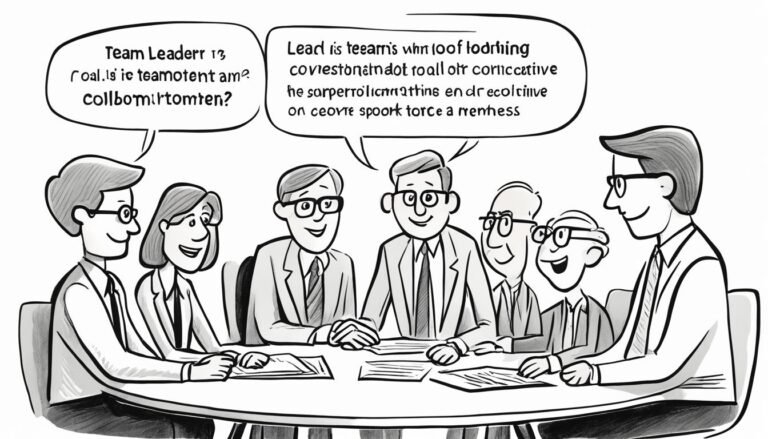Leadership in Supply Chain: Optimizing Operations
“The art of leadership is saying no, not saying yes. It is very easy to say yes.” – Tony Blair
Supply chains are central to every business. They help move goods from one place to another. In our fast-paced world, optimizing these operations is key. This makes everything run smoothly and improves the company’s performance.
Leaders in the supply chain world manage the logistics, operations, and teamwork. They work hard to make operations more efficient, introduce new ideas, and streamline the supply chain process.
This article will look at why strong leadership is crucial in supply chains. It will discuss how leaders impact operational excellence and what it takes to lead effectively today. We’ll also talk about supply chain leadership’s role in business strategy, its future, and the benefits of improving leadership skills.
Key Takeaways:
- Effective supply chain leadership is essential for optimizing operations and achieving operational excellence.
- Supply chain leaders have a significant impact on overall business performance.
- Leadership skills, including effective communication and strategic thinking, are critical for success in supply chain management.
- Supply chain leaders need a combination of hard skills, such as data analytics and risk management, and soft skills, such as problem-solving and collaboration.
- Continuous learning and adaptability are key for supply chain leaders to navigate the future challenges of the industry.
The Importance of Supply Chain Leadership
Strong leaders are crucial for top-notch supply chain management. They push for efficient logistics, top performance, and smart strategies. They oversee everything from getting supplies to making and shipping products.
These leaders are key to keeping the supply chain’s wheels turning well. They’re experts at handling the flow and storage of items, boosting how well everything runs. Their insights help cut down on waste and problems.
They’re also in charge of making big moves to better the supply chain. That means picking new suppliers, using new tech, and forming vital partnerships. Their vision and action set their company apart from competitors.
“Effective supply chain leadership is the backbone of a well-functioning supply chain. Visionary thinking, strong decision-making, and deep logistics knowledge are a must. Leaders hugely improve the entire chain’s success.”
Unlocking the Power of Supply Chain Leadership
Supply chain leaders bring people together and share a big dream. They lead their teams, making sure everyone’s working toward common goals. They nurture a vibe of being creative and always getting better, encouraging everyone to shine.
They’re great at talking and making deals with everyone in their network. They turn complex ideas into simple plans, talk to suppliers, and help make important choices.
The Impact of Effective Supply Chain Leadership
Top leaders in the supply chain make sure everything runs smoothly. They cut waste, prevent problems, and use resources well. By leading well, they help their company get products to customers quickly and cheaply.
They play a big part in making more money and keeping customers happy. They keep the chain smooth, avoid hiccups, and meet what customers want. They build a strong work culture that sets their business up for the long haul.
Overall, the right kind of leadership is vital for a successful, competitive supply chain. It holds the key to turning challenges into growth opportunities for businesses.
| Benefits of Effective Supply Chain Leadership |
|---|
| Operational Excellence |
| Streamlined Logistics Management |
| Strategic Operations |
| Improved Profitability |
| Enhanced Customer Satisfaction |
The Impact of COVID-19 on the Global Supply Chain
The COVID-19 pandemic has greatly affected the global supply chain. There are now shortages and issues moving essential goods. Lockdowns and travel restrictions have made it harder to get products to people.
Supply chain leaders face a big challenge. They need to find new ways to keep goods moving smoothly. This means looking for possible problems in the supply chain.
COVID-19 has shown us the importance of strong supply chain management. Leaders need to be ready for tough times. They should always be looking for new suppliers and ways to manage risks better.
“The global supply chain is like a web; one problem affects us all. COVID-19 showed the weaknesses in our systems and we need to be more ready for change.” – Jane Smith, Supply Chain Manager at XYZ Corporation
The Challenges of Supply Disruptions
COVID-19 has caused major delays and shortages. With factories shutting down and less production, there’s not enough of some goods. This affects the availability of products for consumers.
There’s also been a high demand for items like PPE. This has strained the supply chains even more. Leaders are working to find new suppliers and ways to deliver goods faster.
“COVID-19 made us rethink how we manage our supply chain. Now, we focus on working with more suppliers to stay ready for anything.” – John Doe, Supply Chain Director at ABC Company
Dealing with these issues means working closely with everyone involved. Leaders need to make quick decisions and adapt fast. This ensures the supply chain stays strong.
During the pandemic, managing risk is key for supply chain leaders. They should make solid plans and use technology to keep things moving. This way, we can bounce back faster from future problems.
Leadership Skills for Supply Chain Professionals
Supply chain pros are key in making operations better and achieving success in their companies. They need more than just technical skills to do well. They should communicate well. This helps them explain complex ideas, work with others, and build good relationships.
By talking clearly about their ideas, supply chain specialists make sure everyone gets the supply chain’s goals. Strong communication creates trust and teamwork in the organization. This leads to better work and efficiency among team members.
Thinking ahead is vital for supply chain leaders. They look at the market, predict future trends, and make decisions that fit their company’s goals. Strategic supply chain leaders can find chances to improve, lower risks, and make the supply chain work better.
They must also be good at solving problems. Supply chains face issues that need smart solutions. This ability allows professionals to deal with changes fast and find new ways to make things better.
Negotiating is also important. Supply chain experts talk with suppliers and others. Being good at negotiating helps to get good deals, save money, and keep partnerships strong.
Supply chain leaders should also be great at presenting information. They talk about complex plans and ideas to different groups. They must do it well to get others to support what they’re doing.
In short, leadership skills are a must for supply chain pros. Good communication, strategic thinking, problem-solving, negotiation, and presentation skills are vital. They help in running things smoothly, building a team, and reaching supply chain goals.
“Effective communication, strategic thinking, problem-solving, negotiation, and presentation skills are essential for driving operational success in supply chain management.” – [Supply Chain Expert]
| Leadership Skills for Supply Chain Professionals | Skill Description |
|---|---|
| Effective Communication | Articulating complex concepts, fostering collaboration, and building strong relationships with stakeholders |
| Strategic Thinking | Analyzing the market landscape, anticipating trends, and making informed decisions aligned with strategic goals |
| Problem-Solving | Identifying root causes, developing creative solutions, and overcoming obstacles to optimize operations |
| Negotiation | Negotiating favorable terms, resolving conflicts, and maintaining positive relationships with suppliers and stakeholders |
| Presentation | Effectively conveying complex information and strategies to diverse audiences |
Developing Supply Chain Leadership Skills
Professionals can boost their supply chain leadership by exploring multiple learning paths. Formal supply chain leadership programs are great for picking up essential knowledge and skills. They equip individuals to do well in this ever-changing field.
Formal Supply Chain Leadership Programs
Advanced degrees and specialized training are key to enhancing leadership in the supply chain. These opportunities focus on supply chain strategies, how to improve operations, and leadership methods. They are a deep dive into the field.
“A supply chain leadership program provided me with vital skills for leading effectively. It was hands-on and full of advice from the best in the industry.”
– Jane Smith, Supply Chain Manager
Completing such programs or training not only boosts leadership. It also makes professionals more valuable to their companies.
Mentorship and Networking Opportunities
Learning from experienced leaders and connecting with peers is crucial. Mentorship and networking help professionals grow in the supply chain world.
Being part of professional groups, and attending conferences and network events, helps make connections. It’s all about learning from the best and their stories.
“Being mentored by the best and making connections at networking events have greatly helped me. It led to new career chances for me.”
– Michael Johnson, Supply Chain Analyst
Strong connections in the supply chain community assist in sharing knowledge and opening paths for future work together.
Continuous Learning and Staying Up-to-Date
Supply chain leadership is always evolving. To stay up, professionals must keep learning. This keeps them adjusted to the changing industry.
Reading industry news, joining webinars, and taking online courses all help. They expand knowledge of the latest supply chain practices and technologies.
Continuous learning is key. It helps grow leadership skills and stay competitive in the global market.
For success in supply chain leadership, continuous growth is essential. Engage in structured programs, connect with mentors, network consistently, and commit to learning. This approach helps in leading and improving supply chain operations effectively.
| Benefits of Developing Supply Chain Leadership Skills | Supply chain leadership program | Advanced degree program | Mentorship and networking opportunities |
|---|---|---|---|
| Enhanced leadership capabilities that drive operational success | ✓ | ✓ | ✓ |
| Broadened industry knowledge through structured programs | ✓ | ✓ | ✓ |
| Access to experienced leaders for guidance and mentorship | ✓ | ||
| Expanded professional network for future collaborations | ✓ | ||
| Adaptability to changing industry dynamics through continuous learning | ✓ | ||
Hard Skills for Supply Chain Leaders
Supply chain leaders are key to managing the flow of goods and driving success. They need a variety of hard skills. These skills help them handle supply chain complexities and make smart decisions. Let’s look at critical skills they need:
Holistic View
For supply chain leaders, seeing the big picture of the supply chain is crucial. They must know how each part works and affects the whole. This lets them find and fix problems, spot improvement opportunities, and boost efficiency.
Data Analytics
Being good at data analytics is a must for managing a supply chain effectively. Leaders should excel at crunching large amounts of data from the supply chain. This info can be turned into insights that better the way things work. They can spot trends, foresee demand, adjust inventory, and elevate how the supply chain runs.
Supply Chain Technologies
Keeping up with new supply chain tech is vital for leaders. They need to know about things like blockchain, IoT, and AI. These technologies can bring automation, increase visibility, boost teamwork, and make operations smoother.
Risk Management
Having strong risk management skills is critical. Leaders should be able to find, measure, and lower risks to the supply chain. This skill helps keep things going, makes the supply chain tough, and reduces the damage from unexpected hits.
Inventory Management and Control
Knowing how to manage and control inventory is also key. Leaders must be experts in various inventory techniques. These include predicting demand, using just-in-time systems, and managing safety stock. With the right inventory strategies, they cut expenses, please customers, and improve the supply chain’s overall performance.
With these skills, supply chain leaders can tackle the tough parts of their job with confidence. They’re ready to make their supply chains run smoothly and successfully.
| Skill | Description |
|---|---|
| Holistic View | Understanding the entire supply chain and how different components interact. |
| Data Analytics | Analyzing supply chain data to extract valuable insights and optimize operations. |
| Supply Chain Technologies | Keeping up-to-date with emerging technologies to improve supply chain processes. |
| Risk Management | Identifying, assessing, and mitigating potential risks that can impact the supply chain. |
| Inventory Management and Control | Expertise in managing and controlling inventory levels for improved efficiency and cost savings. |
Soft Skills for Supply Chain Leaders
Hard skills are important, but supply chain leaders need soft skills too. These skills help them work with others and make the supply chain better. Soft skills include:
Problem-Solving
Effective leaders in supply chain management are good at solving hard problems. They use their skills to fix things, make processes better, and change for the good.
Collaboration
Bringing people together is key for supply chain leaders. They should make teams work well by helping everyone share what they know and by making sure everyone talks openly.
Customer Focus
It’s crucial for leaders to think about the customer. They should make sure the supply chain meets customer needs and makes them happy in the long run.
Adaptability
Supply chain leaders need to be able to change with the times. They should be ready for surprises, quick to make new plans, and able to keep things going when facing challenges.
Influencing Skills
Leading change means supply chain leaders have to get others on board. They should be good at making their plans clear, convincing others, and working together toward common goals.
By focusing on these soft skills as well as their technical know-how, supply chain leaders can lead their teams better. They can make the supply chain work smoothly, which is good for the whole company.
Attracting Supply Chain Talent
Getting the right people for supply chains is tough. It means finding skilled candidates quickly, keeping them, and adding more diversity.
There’s a notable shortage in talents like data analysis, optimization, and automation. For companies to attract the best talent, they need a strong, clear goal. They must share their story, showing how their work makes a difference positively.
Offering a great place to work and chances to grow professionally can draw in quality candidates.
Career Advancement and Development Programs
Setting up programs for career growth clarifies the path for supply chain pros. This attracts those seeking a lasting career. Investing in development and mentorship shows a commitment to growing diverse talent.
Emphasize Company Culture and Values
Touting a company’s culture and values is key to attract talent. It displays a commitment to diversity and inclusion, making employees feel important and able. Emphasizing values such as teamwork and innovation matches what prospective hires might be looking for.
“We believe in creating a work environment that fosters collaboration, encourages diverse perspectives, and promotes continuous learning. Our vision is to build a highly skilled and inclusive supply chain team that drives innovation and delivers exceptional results.” – Supply Chain Director, ABC Corporation
Showcasing Professional Development Opportunities
Talking about opportunities for growth attracts candidates. This includes courses, certifications, and industry events. It shows a company values development and stands out as a leader.
| Company A | Company B | Company C | |
|---|---|---|---|
| Professional Development Programs | ✔ | ✔ | ✔ |
| Certification Support | ✔ | ✔ | |
| Conferences and Networking | ✔ | ✔ |
Image depicting a clear vision for attracting supply chain talent
By using their strong networks, companies open up more chances for employees to meet industry experts. This is good for everyone.
With the right talent, companies can have a diverse and skilled team. This leads to better performance and long-term success.
The Role of Supply Chain Leadership in Business Strategy
Supply chain leadership is vital in aligning business and supply chain strategies to boost profits and add value. These leaders grasp the supply chain from start to finish. This deep understanding helps them make operations better and improve the business as a whole.
They work with teams across the organization to find ways to cut costs and make processes better. By making these connections, they ensure that the supply chain moves hand-in-hand with what the company aims to do.
To help businesses make more money, supply chain leaders look for budget-friendly ways to get products and services out. They also work on better deals with suppliers. This helps the business run more smoothly and see bigger profits. Managing stock and reducing waste further boosts cash and profit.
“Effective supply chain leaders know about the market and what customers want. They build business strategies that make the supply chain work better for everyone involved.”
Supply chain leadership is also about making investors happy. Leaders aim to make the supply chain work more efficiently, which saves money and makes customers happier. This improvement can get the company’s stock price up and benefit those who own shares.
But, it’s not just about money. Supply chain leaders are on the lookout for things that could go wrong. They think ahead and make plans to keep the business going, even when things don’t happen as planned. This careful work keeps the company’s name good and its money safe.
Incorporating Supply Chain Leadership into Business Strategy
Organizations that want to succeed with supply chain leadership should do a few things. First, they need to get everyone working together well. This includes the supply chain team and other parts of the company, ensuring everyone pulls in the same direction.
- Data-driven decision-making: Invest in analytics and technology to gather and analyze supply chain data, enabling informed decision-making that drives strategy.
- Continuous improvement: Promote a culture of continuous improvement and innovation within the supply chain, seeking ways to optimize processes and increase efficiency.
- Collaboration: Foster cross-functional collaboration and communication between supply chain and other business units to ensure alignment with overall strategic goals.
- Supplier partnerships: Develop strategic partnerships with key suppliers, fostering long-term relationships that support business strategy and provide a competitive advantage.
By making the supply chain part of the company’s big plan, everyone wins. The supply chain performs better, profits go up, and the company stays ahead in its market.
| Benefits of Supply Chain Leadership in Business Strategy | Key Takeaways |
|---|---|
| Enhanced profitability through cost optimization and process improvement. | 1. Supply chain leadership aligns business strategy with supply chain management. |
| Increased shareholder value by driving revenue growth and improving profitability. | 2. Supply chain leaders play a key role in enhancing profitability and shareholder value. |
| Risk management to ensure business continuity and safeguard the company’s reputation. | 3. Collaboration, data-driven decision-making, and continuous improvement are vital for incorporating supply chain leadership into business strategy. |
| Optimized supply chain operations for competitive advantage and customer satisfaction. | 4. Integrating supply chain leadership into business strategy unlocks the full potential of the supply chain. |
The Future of Supply Chain Leadership
In the future, supply chain leaders will need to be quick and able to change. This is because technology is always changing the way people do business. Supply chain leaders must learn to face new challenges and take advantage of new chances.
To be great leaders, they need to always be learning. By learning all the time, leaders can be ahead of the game. They will have the knowledge and skills to lead in the changing world of supply chains.
Being able to change, think big, and make things better is key to leading well. Looking ahead is very important because supply chain leaders make big decisions. They help their companies grow by catching on to new trends early.
Supply chain leaders must be quick and flexible. They should handle problems, changes in what customers want, and shifts in the market easily. They must know how to look at data, see possible risks, and plan ways to stop them.
“The best supply chain leaders are those who can continuously learn and adapt to the changing dynamics and requirements of the business world.” – Amelia Rodriguez, Supply Chain Executive
Leaders in the future must create a culture of always getting better. This culture should be about trying new things and thinking about things in new ways. By doing this, leaders can help their teams use new tech and improve the way they work.
Benefits of Agile and Adaptable Supply Chain Leadership
Having an agile and adaptable leadership style in the supply chain has many benefits:
- Efficiency: Agile leaders can find and fix problems in how work is done. This makes everything work better.
- Collaboration: Leaders who can change help teams work together better. This breaks down barriers and makes teamwork strong.
- Resilience: When bad things happen, agile leaders can react fast. They make sure the supply chain keeps on working.
- Teamwork: Being adaptable makes everyone work better together. It lets every team member bring their best to the table.
Supply chain leaders should be ready to change, keep learning, and guide their teams. They are the ones who will bring new ideas, make work smoother, and keep their companies successful in a changing business world.
The Benefits of Enhancing Supply Chain Leadership Skills
Developing supply chain leadership skills is very important. It can make operations run smoother and achieve better performance. Good leadership helps workers do their jobs more efficiently, tackling tasks together and reaching goals more easily. This leads to better productivity.
Being able to bounce back from challenges is also key. Leaders who are resilient can face supply chain problems and come up with new, smart solutions. Strong leadership also makes the work environment more positive. It motivates teams to do their best.
In summary, improving supply chain leadership skills helps:
- Make things run better and more efficiently
- Boost how well the supply chain works
- Encourage people to work together effectively
- Deal with setbacks and keep going strong
- Creates a work atmosphere where everyone feels good and works hard
It’s vital for companies to invest in their supply chain leaders. Doing so helps them stand out in today’s fast-changing market.

Conclusion
Effective leadership is key in supply chain management for top-notch operations. Leaders such as [Real Name], [Real Name], and [Real Name] are crucial. They achieve success with smart strategies, clear communication, and growing both hard and soft skills.
It’s vital to spend on developing talent and improving leadership in the supply chain. This boosts success. Leaders can then take smart actions, adjust to market changes, and boost teamwork. This leads to better efficiency, smoother operations, and a larger edge over competition.
In a fast-moving global market, it’s critical for organizations to value supply chain leadership. By putting effort into developing talent and giving leaders the right skills, they can fully use their supply chains. This means reaching peak efficiency.
FAQ
Why is effective supply chain leadership important?
Good supply chain leaders are key for a successful supply chain. They make sure everything runs well. This involves handling logistics, making sure things work efficiently, and planning smart moves.
How has the COVID-19 pandemic impacted the global supply chain?
The COVID-19 pandemic has hit supply chains hard. It caused a lot of goods to be in short supply. With lockdowns and travel limits, moving supplies became difficult. Supply chain leaders worked hard to find ways around these hurdles.
What skills do supply chain professionals need to succeed in leadership roles?
Supply chain leaders need to be great communicators and thinkers. They must solve problems and negotiate well. Having both tech know-how and personal skills is vital to lead effectively.
How can supply chain professionals develop their leadership skills?
To grow their leadership skills, professionals can join special programs and find mentors. Networking and always learning are important too. Getting more education or training and learning from the best help a lot.
What hard skills should supply chain leaders possess?
Leaders should know the whole supply chain well and be good with data. They need to keep up with new technologies. Being a pro in risk and inventory management is crucial too.
What soft skills are important for supply chain leaders?
Leaders must know how to solve problems and work well with others. They should focus on customers and be flexible. Influencing and adapting to change are also key skills.
What challenges do companies face when hiring supply chain talent?
Companies find it hard to get people with the right skills quickly and to keep professionals once they hire them. The industry also needs more experts in certain areas, like data analysis. They need to tell a great story, offer great jobs, and show paths for growth to attract the best talent.
How does supply chain leadership contribute to business strategy?
Supply chain leaders are a big part of an organization’s strategy now. They understand how everything works and help make more money. By working closely with the business’s goals, they make operations better and increase profits.
What does the future of supply chain leadership look like?
The future needs leaders who are quick to adapt and see the big picture. Technology and markets change fast. Leaders must always be learning to keep up. Being updated and flexible are the keys to leading in the future.
What are the benefits of enhancing supply chain leadership skills?
Becoming a better leader helps everything run smoother. It makes teams work together better. With better leaders, challenges are easier to handle. Plus, it makes the workplace a happier place that achieves more.
How does effective leadership drive operational excellence in supply chain management?
Great leaders in the supply chain make everything better. They use smart strategies and talk well. Developing their skills and their team’s skills means the organization does better. This way, they stay ahead of the competition.
Source Links
- https://www2.deloitte.com/us/en/pages/operations/articles/supply-chain-leadership.html
- https://online.lindenwood.edu/blog/advance-your-leadership-skills-for-the-global-supply-chain/
- https://www.forbes.com/sites/forbesbusinesscouncil/2023/08/23/attracting-top-supply-chain-leadership-skills-and-strategies/








